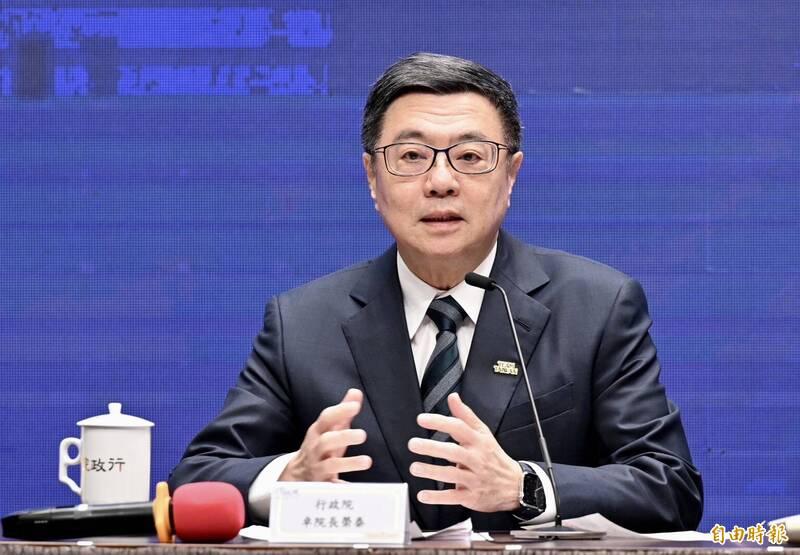The legislature is to vote tomorrow on a motion to reconsider the amendments to the Constitutional Court Procedure Act (憲法訴訟法), a week after the Executive Yuan submitted a formal request to the legislature to reassess the amendment, whose third reading was passed on Dec. 20.
The Chinese Nationalist Party (KMT) caucus said it would not invite Premier Cho Jung-tai (卓榮泰) to give a report on the law to the legislature, as both the ruling and opposition party caucuses met this afternoon to discuss the issue.
The amendment is a political maneuver, Cho said today.

Photo: Lo Pei-de, Taipei Times
By strictly regulating the number of grand justices on the Constitutional Court, the court would be paralyzed and unable to rule on constitutional matters, Cho said.
This would be the greatest harm done to the Constitution in history, he added.
The Executive Yuan could not accept this, he said, adding that he hopes that legislators would review the bill again and support the motion to reconsider it.
When submitting a request to President William Lai (賴清德) about requesting a new vote, the Executive Yuan’s goal was not to create opposition, but to allow legislators to discuss the matter carefully, Cho said.
Cho called on legislators to support the motion, and said that if they insist on implementing the new amendments, they would undermine the Constitution and deprive citizens of the right to seek constitutional redress.
Even if the motion fails, there is still some room for discussion on how to interpret the amendments, Minister Without Portfolio Lin Ming-hsin (林明昕) said.
Lin mentioned a judicial remedy known as the “preventive relief,” which serves as a legal tool to protect people’s rights before they are actually violated, may be proposed, but said it would be up to the Grand Justices to decide if they accept it.
The motion cannot be voted on without discussion, the Democratic Progressive Party (DPP) caucus said.
The bill is important and could paralyze the judicial system, DPP caucus chief executive Rosalia Wu (吳思瑤) said in a news conference at the Legislative Yuan today, questioning why the KMT passed it without discussion.
Wu also questioned the role of Legislative Speaker Han Kuo-yu (韓國瑜), saying that he failed to maintain neutrality in this debate by allowing the KMT to forego discussions.
The legislative and executive branches of governments should be responsible and engage in dialogue, Wu added.
Meanwhile, 90 legal experts issued a joint statement today, saying that the amendment undermines the separation of powers and hinders the ability of citizens to seek redress when their rights are infringed.
The experts expressed concern regarding the future of Taiwan’s constitutional democracy and called for legislators to return the law to its original state.
Additional reporting by Lee Wen-hsin

Beijing could eventually see a full amphibious invasion of Taiwan as the only "prudent" way to bring about unification, the US Department of Defense said in a newly released annual report to Congress. The Pentagon's "Annual Report to Congress: Military and Security Developments Involving the People's Republic of China 2025," was in many ways similar to last year’s report but reorganized the analysis of the options China has to take over Taiwan. Generally, according to the report, Chinese leaders view the People's Liberation Army's (PLA) capabilities for a Taiwan campaign as improving, but they remain uncertain about its readiness to successfully seize

HORROR STORIES: One victim recounted not realizing they had been stabbed and seeing people bleeding, while another recalled breaking down in tears after fleeing A man on Friday died after he tried to fight the knife-wielding suspect who went on a stabbing spree near two of Taipei’s busiest metro stations, Taipei Mayor Chiang Wan-an (蔣萬安) said. The 57-year-old man, identified by his family name, Yu (余), encountered the suspect at Exit M7 of Taipei Main Station and immediately tried to stop him, but was fatally wounded and later died, Chiang said, calling the incident “heartbreaking.” Yu’s family would receive at least NT$5 million (US$158,584) in compensation through the Taipei Rapid Transit Corp’s (TRTC) insurance coverage, he said after convening an emergency security response meeting yesterday morning. National

Taiwan is getting a day off on Christmas for the first time in 25 years. The change comes after opposition parties passed a law earlier this year to add or restore five public holidays, including Constitution Day, which falls on today, Dec. 25. The day marks the 1947 adoption of the constitution of the Republic of China, as the government in Taipei is formally known. Back then the Chinese Nationalist Party (KMT) governed China from Nanjing. When the KMT, now an opposition party in Taiwan, passed the legislation on holidays, it said that they would help “commemorate the history of national development.” That

Taiwan has overtaken South Korea this year in per capita income for the first time in 23 years, IMF data showed. Per capita income is a nation’s GDP divided by the total population, used to compare average wealth levels across countries. Taiwan also beat Japan this year on per capita income, after surpassing it for the first time last year, US magazine Newsweek reported yesterday. Across Asia, Taiwan ranked fourth for per capita income at US$37,827 this year due to sustained economic growth, the report said. In the top three spots were Singapore, Macau and Hong Kong, it said. South